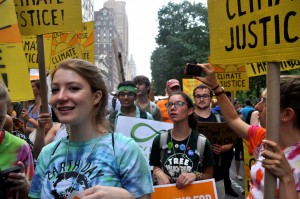 Walking side-by-side down Central Park West, UR students joined nearly 400,000 others from across the globe in New York City on Sunday, Sept. 21 as a part of the People’s Climate March.
Walking side-by-side down Central Park West, UR students joined nearly 400,000 others from across the globe in New York City on Sunday, Sept. 21 as a part of the People’s Climate March.
The march, scheduled just two days before the U.N. Climate Summit at U.N. headquarters in Manhattan, is now being called “history’s largest march for climate.”
Over 1,500 organizations from around the world, including the Sierra Club, NAACP, and the National Audubon Society, put their resources together to organize the event.
The goal was to express to the international community and leaders that climate change and further action towards sustainability is of utmost importance to people of all races, ethnicities, and economic classes.
Although Sunday marked the first ever People’s Climate March, it still managed to top all others environmental marches.
Among the masses were big-time environmentalists and policymakers, including environmentalist Bill McKibben, actor and U.N. Messenger of Peace on Climate Change Leonardo DiCaprio, Al Gore, and U.N. Secretary General Ban Ki Moon.
Word of the march was spread around UR in environmental science classes and through various groups including Grassroots and the Rochester Zen Center, both of which helped coordinate bus transportation to Manhattan with Sierra Club.
“My professor said there were six seats left on the bus,” sophomore Jean Brownell said. She jumped on the opportunity to buy her ticket.
Junior Brian Rinehart knew he wanted to attend the march back in August after attending the Environmental Protection Agency’s public hearings in Atlanta, GA, with a group of Sierra Club members from Kentucky.
“On the way back [from the hearings], they were promoting the march and I decided I should probably organize people from U of R to go,” he said. Rinehart then contacted Grassroots and a few other campus organizations, encouraging them to spread the word.
Like with Brownell and Rinehart, climate change is of major concern and importance to all students who attended.
“I wanted to show our political leaders that this is not a peripheral issue, that people are concerned, and that there are groups committed to finding solutions,” freshman Joey Stephens said.
Stephens valued the importance of the statement the march made directly to leaders, both nationally and internationally, as marchers gathered at the U.N. for the Climate Summit.
Students were particularly astounded by the energy and unity of all who attended the march.
Chants of “Frack is whack” and “Hey, Obama, we don’t want no climate drama” echoed across the vast crowds as strangers carried matching signs supporting similar causes and groups.
“It really filled me with hope,” sophomore Emily Mesiti said. “There were so many people who want to make important changes for our future.”
However, after witnessing such a motivational and inspirational environment, some students felt as though UR was lacking a similar response.
Stephens believes the University does a good job promoting sustainable lifestyles, recycling, and reducing waste, but said that “there is not enough of a conversation on divestment.”
He noticed that students at other schools, such as Tufts, Harvard, and Duke are pushing their administrations to cut back on the usage of fossil fuels, but didn’t feel the discussion was as prevalent at UR.
“The University could be more responsible with its investments, and could invest more on making campus greener,” Reinhart agreed. He believes the student body’s interest in social action isn’t as prominent as it could be.
“Most people seem so caught up in education that it’s difficult to see the bigger picture, which is understandable but unfortunate,” he said.
“We must recognize that it will soon be our turn at the helm and recognizing our own voice in the issue as future leaders is critical,” Stephens said.
After having attended such an incredible historical event, students feel that further attention should be paid to issues as important as climate change in the form of public awareness, seminars, and other activities.
“This kind of stuff should be discussed more in classes,” Brownell said. “We were loud, and hopefully it reached people who don’t know about the issue or helped to inspire them.”
If this is the case, the march will have done exactly what it was designed to do: increase awareness around the globe, of which UR is most definitely a part.
Listro is a member of the class of 2017.

